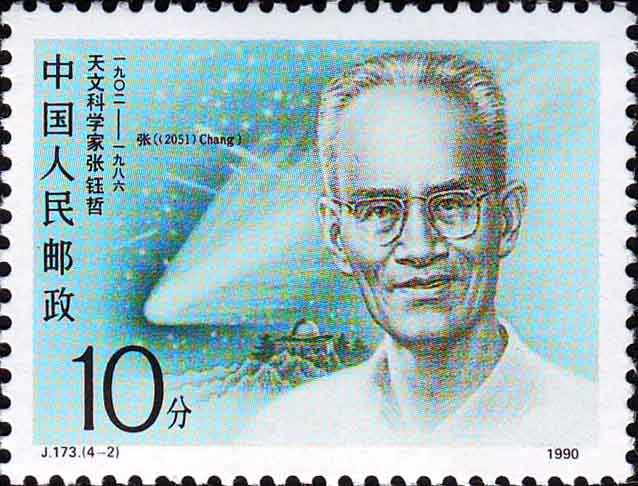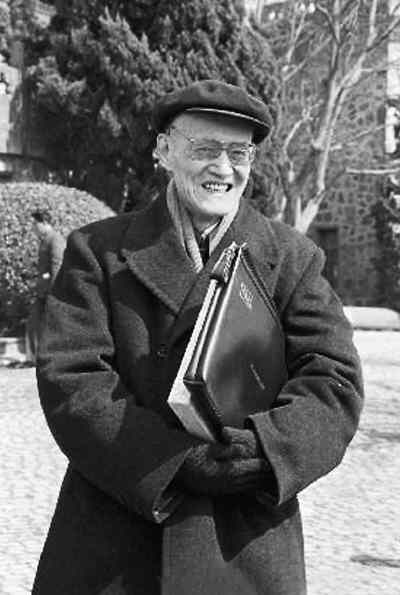When I was in grade 1, I was reading a book, whose name I have forgotten, on the universe, stars, astronomy and so. There was a counterpart on earth. I just liked such books so much at that time, that I bought them sets by sets. One day I was reading a passage on the lunar and solar eclipses, which was saying that even though the solar eclipses happen more often that the lunar ones, most people would only have the chance to see lunar eclipses but not solar eclipses throughout their life. Why? Because each solar eclipse is only visible to a small region on the earth since the moon is small compared to the earth, while lunar eclipses are visible to half the earth (the half on the dark side). Moreover, solar eclipses are very short and susceptible to weather changes. Here comes an example on the book, that in some year (around 1970?) there was a solar eclipse in China. Mr. Zhang Yuzhe who was already over 70 then hurried there for it. Unfortunately the eclipse was shadowed by the raining cloud. There was a portrait for Mr. Zhang Yuzhe on the page, who appears to be a thin, long-faced exotic-looking elderly. That aroused my interest for Mr. Zhang, but back then information communication was shabby. I was a little kid in a small town, without the Internet. How was I going to gather the related knowledge? But such curiosity wander in my mind, never disappearing. P.S. I was actually focus more on the “古稀” (over 70 years old) thing, firstly for I was almost illiterate and feeling fresh about this fancy word, secondly for it was emphasized somewhere else addressing life of human in the very book, that 70 years is equal to only about 20000 days, and that is “人生七十古來稀” (people hardly live up to 70 since the old days). I always felt pathetic about this, because books were mentioning that it would take over 200 years for Pluto to trip around the sun, and even for Halley’s comet it would take over 70 years.
There wasn’t Internet until many years later, when I entered the junior high. But I was then addicted to computer games (records of this period are in my Qzone. You can dive into it if your are interested.), and then to English, to mathematics, to politics, to digital devices. And I got oblivious to the astronomy things.
When I was in grade 12, @wdq was reading a book on the history of Tsinghua University. I borrowed the book from him, thus searching for related facts on the Internet. I ran into an article on douban narrating the political movements inside the old (ROC) Tsinghua. An anecdote was mentioned also that when Ren Zhigong came back to the mainland, he asked to meet his old peers. But somehow these people all died, and Zhu Kezhen who was in the company was shocked by this. Interestingly, I suddenly thought about Zhang Yuzhe, probably because he was also an alumni of Tsinghua University, and I saw his name on the book for a moment (I believe). In short, taking this opportunity, I came to know generally about Mr. Zhang Yuzhe’s life: He was the head of the Purple Mountain Observatory since the establishment of PRC until he passed away. But knowledge is still limited.
I just saw a student studying astronomy in Nanjing University. Nanjing, astronomy, these keywords remind me of Mr. Zhang Yuzhe. I said I was going to write something days ago, so I wrote this article. I was watching 河汉之星——张钰哲(03) when I was writing. The video tells us that he saw Halley’s comet when he was 9 (Xuantong 2 (year) of the Qing Dynasty), and was inspired to do research in astronomy. He then again saw the comet in Purple Mountain Observatory, in A.D. 1986. Judging from his biography, he died soon after this. How fortunate would it be to be able to see Halley’s comet twice in one’s life!
Mr. Zhang Yuzhe was the head of Purple Mountain Observatory for many years, of great renown in the academia. One lunar crater is named after him, so is an asteroid. In 1928 he discovered an asteroid and name it “中華” (China), which is the first ever asteroid discovered by a Chinese person. In 1941 he took the very first photo of a solar eclipse inside the territory of China, which was captured by the Empire of Japan. It is said that he took it under the risk of bombing. He is, at least from my rough view, an interesting person. Sadly, the majority today don’t even know him. There are not many data about him on the Internet, except few articles written in a communism revolutionary flavor. I never saw people talking about him. Such degradation does not seem to match him as the exactly pioneer of China’s astronomy. People are getting rich these days, buying more and more cameras, telescopes, equatorial mounts and becoming astronomy fans. But still no one is saying anything about Mr. Zhang Yuzhe, as far as I heard. Confucius said, “君子疾沒世而名不稱焉” (virtuous people are afraid that their names fade away after their deaths). Following this way of thinking, the story of Mr. Zhang could not feel more pitiful.

But from my point of view, he can say that “I’ve live a wonderful life” at least. His life is fascinating and magnificent enough. There shall be lots of such interesting people throughout the history. How come my life always seem dull and boring? How I wish I could be such an interesting person! How I wish I could meet such interesting persons in my life!
June, 30th, 2014



Salam kenal min, informasi yang di berikan bermanfaat
sekali. Makasih ya.
Wohh just what I was looking for, appreciate it for putting up.
You are a thoughtful man.
测试
你什么时候写新的东西?
等我有点时间。现在只有存货了,而且还不多。